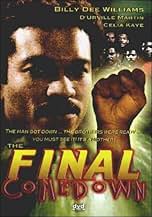Ajouter une intrigue dans votre langueBlack revolutionaries take action in the white suburbs.Black revolutionaries take action in the white suburbs.Black revolutionaries take action in the white suburbs.
Celia Milius
- Renee Freeman
- (as Celia Kaye)
Ed Cambridge
- Dr. Smalls
- (as Edmund Cambridge)
Morris D. Erby
- Mr. Johnson
- (as Morris Erby)
Histoire
Le saviez-vous
- AnecdotesReleased between two of Billy Dee Williams' best films; television's "Brian's Song" 1971, and the theatrical "Lady Sings The Blues" 1972.
- Autres versionsBlast! (1976) is an alternate version of this film, with new footage directed by Allan Arkush. The director credited is "Frank Arthur Wilson."
- ConnexionsFeatured in Planet X: Episode #2.1 (2006)
Commentaire en vedette
My earliest memories of Billy Dee Williams were him as Lando Calrissian in The Empire Strikes Back. At that time I knew him as a relaxed hair heart throb to many women of color. I never knew he had a film like this to his credit.
This movie is excellent and it was 100% socially relevant for 1972.
Billy Dee plays Johnny Johnson, a frustrated young Black man like so many others at that time. He was educated, angry, and being crushed under the weight of being young, educated and Black in America. He externalized all of that frustration and acted on that frustration and that's where the movie picks up: at the point of no return.
This movie is not for everyone, Black or White. This movie is an uncensored, no holds barred reflection of American society at that time. It's a perspective that was never seen on T.V. or heard on radio. It's a perspective that one would only get by entering the ghettos and projects of America. The dialog was heavy and the actions taken were costly, but such a thing was almost inevitable.
This movie had to be made just as it was because it is a chronicling of an era. Whether the names and the people were real is immaterial. What was real was the anger, the frustration, the repression, the oppression, and the natural bubbling over from all of that being mixed together. I'm glad this movie was made and that I had the opportunity to watch it.
This movie is excellent and it was 100% socially relevant for 1972.
Billy Dee plays Johnny Johnson, a frustrated young Black man like so many others at that time. He was educated, angry, and being crushed under the weight of being young, educated and Black in America. He externalized all of that frustration and acted on that frustration and that's where the movie picks up: at the point of no return.
This movie is not for everyone, Black or White. This movie is an uncensored, no holds barred reflection of American society at that time. It's a perspective that was never seen on T.V. or heard on radio. It's a perspective that one would only get by entering the ghettos and projects of America. The dialog was heavy and the actions taken were costly, but such a thing was almost inevitable.
This movie had to be made just as it was because it is a chronicling of an era. Whether the names and the people were real is immaterial. What was real was the anger, the frustration, the repression, the oppression, and the natural bubbling over from all of that being mixed together. I'm glad this movie was made and that I had the opportunity to watch it.
- view_and_review
- 3 déc. 2019
- Lien permanent
Meilleurs choix
Connectez-vous pour évaluer et surveiller les recommandations personnalisées
Détails
Box-office
- Brut – États-Unis et Canada
- 163 591 $ US
- Durée1 heure 23 minutes
- Mixage
- Rapport de forme
- 1.85 : 1
Contribuer à cette page
Suggérer une modification ou ajouter du contenu manquant

Lacune principale
By what name was The Final Comedown (1972) officially released in Canada in English?
Répondre




























